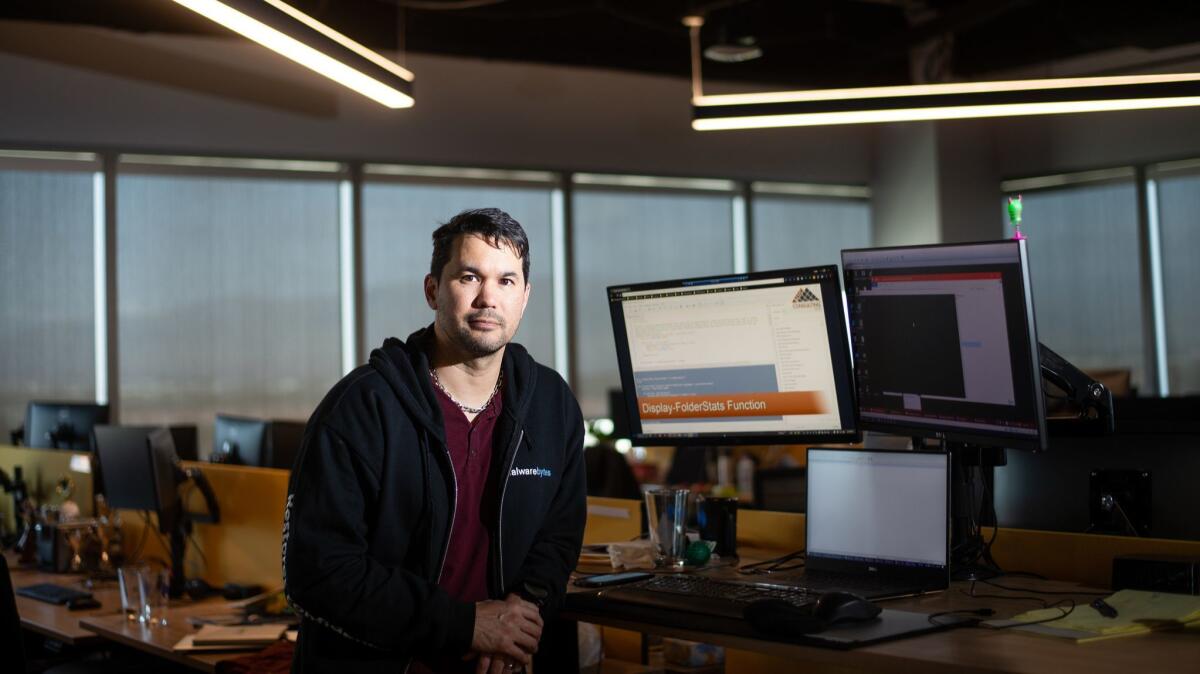Algorithms are coming for their jobs, so workers are teaching themselves algorithms

- Share via
Reporting from San Francisco — When cybersecurity firm Malwarebytes started automating its quality assurance testing last year, it knew that the move could put more than four dozen employees out of work.
Rather than simply replace them with tech, though, the Santa Clara, Calif., firm turned to tech to save their jobs.
The company signed up with Udemy for Business, an online learning platform that teaches courses ranging from data science to sourdough bread-making. Malwarebytes identified the skills its quality assurance testers would need to stay relevant in the rapidly changing cybersecurity industry.
Then it told its staffers to buckle in — it was time to get “up-skilled.”
As automation becomes ubiquitous, education start-ups such as Udemy, Coursera and General Assembly are positioning themselves as the nexus between today’s workforce and tomorrow’s jobs.
Unlike traditional college programs that can take anywhere from two to four years and tens of thousands of dollars to complete, the online schools frame themselves like vocational programs for the Silicon Valley set. They offer training in a specific skill — say, learning a programming language — in months, rather than years. Coursera offers some of its courses for free but also has programs where it charges upward of a few hundred dollars. Udemy’s courses for individuals start at $10.99, while its enterprise-facing arm, Udemy for Business, offers group rates for companies that want to sign up entire teams.
Online learning and micro-certification are increasingly appealing to individuals and businesses seeking to future-proof themselves against automation, or introduce automation without having to fire and rehire a more highly skilled workforce.

“It’s completely changed how we think of training,” said Brent Boeckman, global learning and development manager at Malwarebytes. “In the past, you’d have to budget to send employees across several states to do a course, you’d have to think about travel and hotel costs, and if you only had the budget to send three people you’d have to think, who are the three I can send?”
With automation predicted to displace as many as 73 million, or a third, of U.S. workers by 2030, futurists and automation experts say that retraining at every stage of a person’s career will probably be the most viable path for those who intend to keep working.
The quality assurance testers at Malwarebytes, for example, previously tested the company’s software manually: They would run a program, check to see if it logged any errors, lather, rinse, repeat. A computer now handles those mundane tasks, which frees the “up-skilled” workers to take on the more complex tasks. With their newfound programming knowledge, they’re able to identify errors in the company’s codebase and contribute to a solution with the company’s developers.
“The level of understanding between teams is now more on an even par,” said Noah Christianson-Stafford, 47, a software quality assurance engineer who started at Malwarebytes five years ago as an entry-level tester and now, having learned coding languages Python and PowerShell, can handle more challenging work.
In San Francisco, bonds trader David Gagnon, 50, has done more than a dozen courses in programming and machine learning on Coursera to protect his own career. In his more than 20 years in the business, he’s seen global trading desks go from employing 10 traders and 10 assistants, to 10 traders and a handful of computer programmers who, working together, do 10 times the trades.
“We’ve had huge productivity gains, and almost all of that is driven by electronic trading,” Gagnon said.
Rather than wait around for automation to render his role obsolete, Gagnon pursues online retraining in his spare time, which helps him understand how the electronic systems work. Automation is far from perfect, Gagnon said, which is why having basic programming and data science skills lets him spot errors and vulnerabilities before they balloon and cause mayhem — making him a more valuable bonds trader.
“It used to be that you could go to law school or medical school and, boom-boom, you were done,” Gagnon said. “Now you have to think about how you’re going to up-skill yourself every couple of years.”
Futurists who say that automation will ultimately improve society rather than lead to mass unemployment have said that if everyone can do a job slightly more complex than what they’re currently doing, then most people will remain employed in the automation age. But even the most optimistic of futurists aren’t convinced that America’s education system is equipped to retrain the nation’s more than 126 million full-time workers.

The jobs of the future will probably need more education than the K-12 system currently provides, according to Byron Reese, author of “The Fourth Age: Smart Robots, Conscious Computers, and the Future of Humanity.” This is where education platforms such as Udemy, Coursera and General Assembly seek to make a mark, helping individuals and employers plug skills gaps that will arise from automation — and profiting from it.
Already, the online schools have seen a surge in sign-ups from businesses that want to retrain entire teams within their workforce.
Since launching Coursera for Business, its business-facing service nearly two years ago, Coursera, which is backed by venture capital firms such as Kleiner Perkins Caufield Byers and New Enterprise Associates, now has more than 1,000 employers on board.
Udemy, which has raised funding from firms such as Stripes Group and Norwest Venture Partners, declined to say how many companies it currently works with, but said it counts PayPal, Lyft, Pinterest and Booking.com among its customers. Udemy for Business has grown 265% in the last year.
General Assembly, best known for its in-person coding boot camps, has seen its business customers double over the last year to more than 300 companies. It was acquired by one of the largest temp staffing agencies in the world, Adecco, last month for nearly half a billion dollars.
Individuals have also sought out these platforms to bolster their skills, or to change careers entirely.
The for-profit education sector has faced growing scrutiny over its costs and efficacy, and some start-ups have failed to pass muster.
Silicon Valley’s Coding House, for instance, promised to teach students programming languages and guaranteed high-salaried job placements, but failed to deliver, according to regulators. The school was fined $50,000 by the Bureau for Private Postsecondary Education in 2016 for making false statements and ordered to shut down.
And even if schools do right by students and don’t overpromise, they still aren’t a panacea. Reese likened them to home exercise equipment — completion rates are low, and you only get as much out of it as you put into it.
There’s also irony in the fact that these online schools purport to help students stay relevant in the labor market while they themselves pose a potential threat to the relevance of the existing education industry. Where traditional education institutions might hire many instructors to teach a course, online learning allows for lessons to be disseminated to an endless number of students, bypassing the faculty-intensive model.
A more radical idea is to make junior college free for everyone, or to extend high school through grade 14, Reese said. The extra two years could be vocational for some students and pre-university for others. It wouldn’t be unprecedented: At the dawn of the 20th century when most American children left school before eighth grade, America was one of the first countries in the world to guarantee a high school education under the premise that the jobs of the future would require more education.
“This, as much as anything, propelled the U.S. into the preeminent economic position it continues to enjoy,” Reese said. “Now we are at that same place again.”
In lieu of major shifts in the public education system, Gabe Batstone, chief executive of Contextere, a company that provides artificial-intelligence tools to blue-collar workers to increase their productivity, says companies, individuals and government need to be proactive in training workers and finding ways to support those who can’t retrain.
Companies have a responsibility to their employees, governments have a responsibility to their constituents, and “we all have individual accountability,” Batstone said.
“We all have to take ownership of what we want to do, assess the skills we have and the ones we don’t but want, and go get them.”
Twitter: @traceylien







